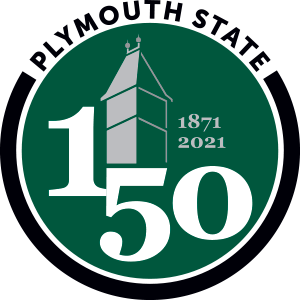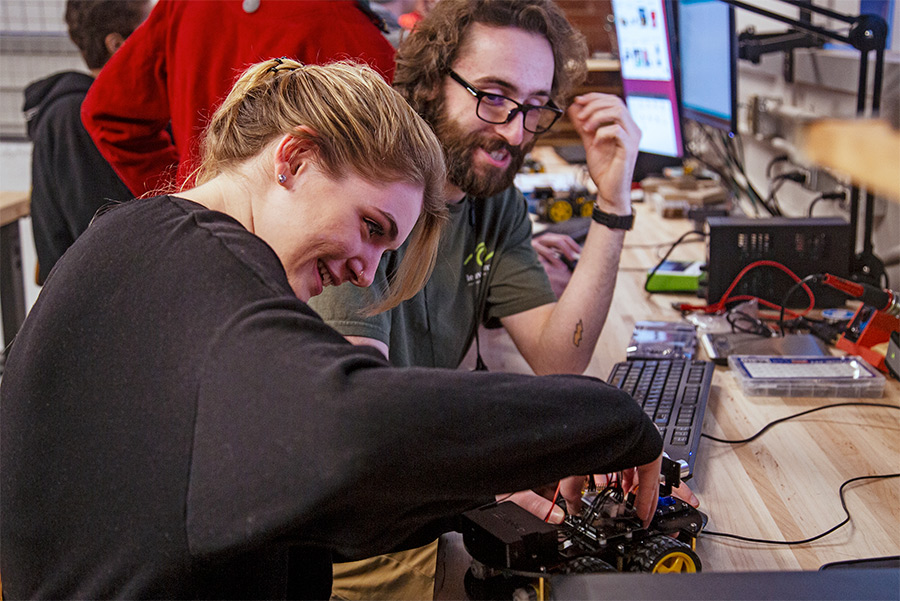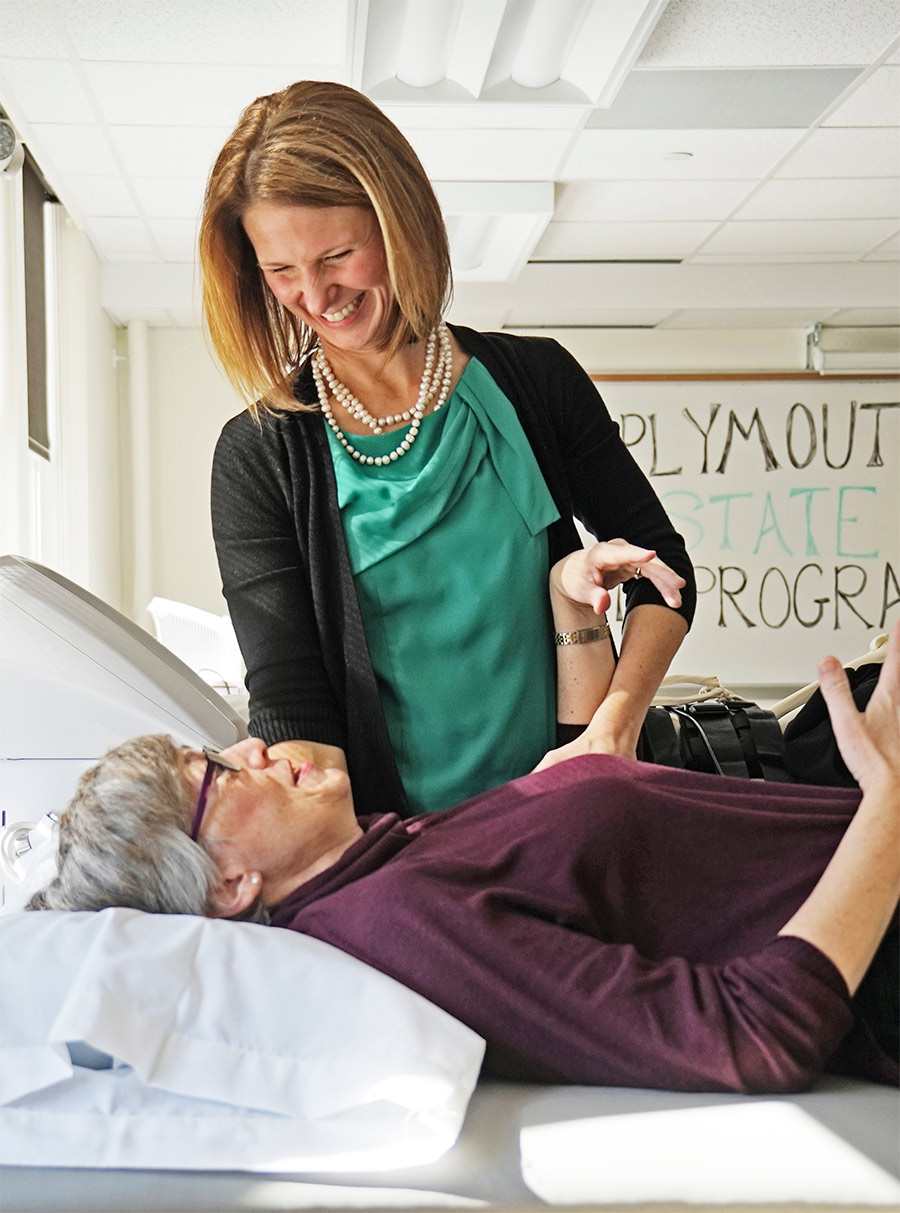 Plymouth State University’s Place in the World Today
Plymouth State University’s Place in the World Today
Transforming to meet today’s needs
Recognizing that a fundamental redesign was needed to better prepare graduates for today’s marketplace, Plymouth State began a process in 2015 that has since transformed the University and continues to evolve. PSU’s Integrated Clusters learning model is a flexible, efficient, and responsive version of higher education for the twenty-first century. It is based on problem solving, integrative thinking, teamwork, and an entrepreneurial spirit with students engaged in the various challenges of our times, and the cross-disciplinary thinking so important in communicating, actualizing, and synthesizing new ideas in an information rich environment.
Plymouth State has broken down barriers that previously separated both academic fields and administrative functions by reorganizing 24 departments and three colleges into seven interdisciplinary Clusters. By eliminating these separations the University has achieved necessary efficiencies in its financial operations while spurring creative collaborations and winning public backing. Despite the pandemic, PSU’s enrollment has remained strong, as students and their families trust that programs will meet their scholarly aspirations and career goals, and that graduates are prepared to hit the ground running in their home communities.
Integrated learning experiences help to prepare students to tackle complex issues that have no singular solutions, such as education reforms, race relations, criminal justice, and so many other contemporary topics that students care deeply about. First-year students now work in interdisciplinary teams to propose solutions to societal challenges, themed general education courses revolve around meaningful topics, open laboratories bring local businesses, organizations, and alumni together with students and faculty to work on projects, and capstone projects feature signature work that is important to both students and society. Plymouth State University builds the necessary skill sets around students’ majors so they can be effective, team-based problem solvers.

Learning to make meaningful contributions begins right away for selected students through the University’s Summer Ascent Program, which helps first-years navigate the transition to college and builds confidence in their academic, social, and financial skills. Programs like this are especially important at Plymouth State, where more than half of all students are either first generation or low income.
Actively implementing our strategic vision
Recent examples of this include:
- PSU’s fully accredited Doctor of Physical Therapy (DPT) program features early opportunities for clinical practice. Plymouth State is the first public higher education institution in New Hampshire to offer the degree.
- The University is giving students more options to earn less costly degree combinations more quickly, including new accelerated dual degree programs in business, communication and media studies, and exercise and sport physiology.
- Electromechanical Technology and Robotics (EMTR) is a bachelor’s level program in robotics unlike any previously offered in New Hampshire. The program features hands-on, kinesthetic learning with courses in electronics, mechanics, microcontrollers, manufacturing technologies, and programming. In addition, PSU annually hosts the Governor’s Cup in robotics.
- The Transformative Innovation & Design Entrepreneurship (TIDE) Program is part of PSU’s own transformation to a more entrepreneurial institution. TIDE instills an entrepreneurial will and enterprising mind-set into students of all majors by teaching the needed design skills and entrepreneurial tools to create and grow ventures of any kind.
- The value of interdisciplinary studies, coupled with résumé-building opportunities for experimental design and data gathering, are at the core of the Computational and Applied Mathematical Sciences (CAMS) discipline.
- The University’s new open laboratory, the Draper & Maynard Makerspace, provides students with an extraordinary opportunity to work in cutting-edge technology across the entire spectrum of additive manufacturing and design. The makerspace makes possible interdisciplinary collaborations in physical computing, healthcare, theatrical automation, environmental sciences, and hydroponics, among many other areas of interest.
- The new Public Health discipline is mobilizing community partnerships to identify and solve regional health problems, which have taken on added significance amid the pandemic.
- The Center for Cybersecurity at Plymouth State University, to be launched this summer, will feature a program developed by global cybersecurity education leader Cybint and taught by PSU faculty. The intensive training up-skills and re-skills workers into one of the world’s fastest growing industries.
- PSU is an active leader in plans to extend the I-93 tech corridor to the northern half of New Hampshire and is working with communities to extend internet connectivity, a key to further regional development.
Our service spans the state
Some examples of Cluster project collaborations and accomplishments include the University’s in-house Student Design Company, which helped Country Cupboard Candies grow its business, community development projects in Lancaster, NH, an economic impact study and marketing materials for the Castle in the Clouds historic attraction in Moultonborough, NH, French-language materials to encourage Quebecois tourism, and a resiliency study produced for Warren, NH.


Plymouth State has a distinguished history of serving the state’s educational needs, and the University’s educator program is currently accredited by both the Association for Advancing Quality in Educator Preparation (AAQEP) and the Council for the Accreditation of Educator Preparation (CAEP). PSU is the first institution in New England and one of only four nationally to have earned this dual accreditation. PSU’s Problems of Practice model of innovation mentors educational leaders, and the University regularly hosts a summer summit that focuses on multiage competency-based education and foundations in co-teaching, equity, and problem-based learning.
This sharing of our expertise occurs in many other forums, from the town and state officials, scientific experts, and members of the general public who gathered for the University’s New Hampshire Water and Watershed Conferences, to the community organizations the University partners with to combat substance use issues through the Climb Above Addiction program. Plymouth State continually reevaluates offerings and is proud to launch its newest degree program, the bachelor of science in climate studies. It’s the only one of its kind in New Hampshire and one of the first in the nation, and will take its place alongside PSU’s nationally-recognized meteorology program.
As this magazine is being written, we remain in the throes of COVID-19, and Plymouth State University’s pandemic planning has been built around cooperation with local and regional businesses, state offices and organizations, and members of the public. Students said overwhelmingly that they hoped to return to campus last fall, and they were able to do so and continue toward degree completion. They are eager to help rebuild our damaged economy, and PSU has responded by incorporating today’s pressing issues in the classroom.
Students learn about pandemics past and present in microbiology courses, crunch COVID data in geographic information system (GIS) courses, and consider other top of the news topics through studies of race, class, crime, and justice. Senior nursing students graduated early in 2020 to take their places on the frontlines of healthcare, and current nursing students are helping with vaccination clinics and testing for COVID symptoms in dozens of agencies across New Hampshire.
As Plymouth State University embarks on its next 150 years, it is proud of its contributions and looks forward to continued leadership on behalf of New Hampshire’s citizens and communities. ■ Peter Lee Miller